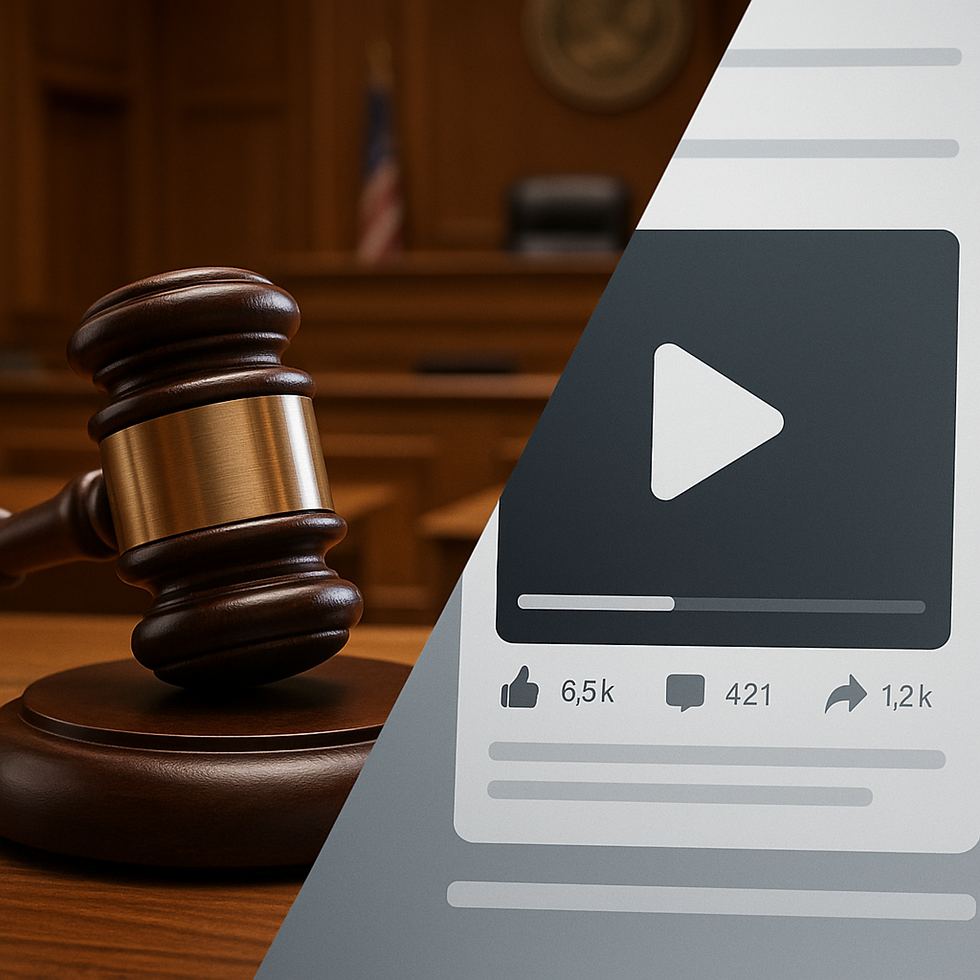When Annoyance Becomes a Crime: The Rise of Stan Lawfare
- Boss Global Radio

- Aug 18, 2025
- 4 min read

On Monday, August 18, 2025, eight members of a Filipino pop group marched into the Hall of Justice of Sta. Rosa, Laguna. With their lawyer, Atty. Joji Alonso, at their side, they filed a criminal complaint against an individual accused of circulating a “spliced” video. The two-minute clip allegedly showed nothing but negative reactions during a food-tasting segment, altering the tone of the original show.
In a vacuum, that sounds like garden-variety internet culture: edited memes, selective clips, and satire. In the Philippines, though, the group is pursuing criminal charges for “unjust vexation” under Article 287 of the Revised Penal Code, linked to the Cybercrime Prevention Act of 2012.
Their lawyer spelled it out:
Possible penalty: 6–12 years in prison (prisión mayor).
Damages sought: ₱1 million for each member (₱8M total).
Framing: “This complaint emanated from a spliced video… what was left was all negativity.”
And, of course, ABS-CBN News—part of the group’s own label ecosystem—blasted it across social media, with photos of all eight idols lined up like plaintiffs in a courtroom drama.
This wasn’t just law. It was theater.
What Is “Unjust Vexation”?
In the Philippines, “unjust vexation” is a catch-all offense dating back to 1930. It criminalizes any act that “annoys, irritates, or disturbs” someone without lawful justification.
On paper: the penalty is arresto menor (1–30 days in jail) or a fine.
When cybercrime is invoked, penalties escalate, sometimes stretching into months or years. Fans and media inflate this further by citing “6–12 years” as though it were certain.
In practice, it means you can file a criminal case not because you were threatened, defrauded, or endangered—but because you were annoyed.
That vagueness is the problem. “Annoyance” isn’t objective. It’s whatever the complainant says it is and whatever a prosecutor decides to entertain. Which makes it a perfect bludgeon for the powerful.
The U.S. Comparison: Protected Speech, Not Prison
Now imagine this same scenario in the United States.
A pop group appears on a YouTube food-tasting show.
Someone edits a two-minute clip of just the negative reactions.
It goes viral, and people laugh, criticize, or comment.
What happens next?
Satire & parody are protected. Under Hustler Magazine v. Falwell (1988), even offensive satire that causes “emotional distress” is free speech.
Public figures face higher bars. Under New York Times v. Sullivan (1964), they’d have to prove “actual malice” for defamation—false claims made knowingly or recklessly.
No criminal case. At most, a civil defamation lawsuit (rare and costly) or a takedown notice. But nobody goes to jail for an “annoying” edit.
The same conduct that lands you in courtroom jeopardy in the Philippines would be considered legal satire in the U.S.
That’s the double standard: one system prioritizes free expression, the other prioritizes “honor” and “dignity,” often at the expense of criticism.
Law as PR: Courtrooms as Stages
The way this complaint was rolled out matters.
Cropped screenshots of the filing were posted online.
A choreographed media blast from ABS-CBN News.
Fan hashtags (#ProtectOurIdols) trending in sync.
This wasn’t just a legal step—it was a performance.
It sends a message: “If you criticize us, if you splice a video we don’t like, you risk prison time and millions in damages.” That’s not just about accountability—it’s about intimidation.
Globally, we’ve seen this before:
K-pop labels (SM, YG, and JYP) are filing “malicious comment” cases against anonymous users.
Hollywood trials (Depp vs. Heard) turned into media spectacles where the court of public opinion mattered more than the verdict.
SLAPP suits in the U.S., where corporations sue critics to shut them up, even when they know the case won’t hold.
This is the same playbook—but in a country where criminal law makes it sharper.
The Immediate Fallout: From Context to Court Threats
Even inside fan communities, the tone changed overnight. Some tried to defend context:
“Please stop with the crab mentality. They were simply trying out some food, some of them for the first time. It was an international show, not even uploaded on their own channel. Before spreading negativity, understand the full picture.” — Isabel, FB group
Others still critiqued the idols’ on-camera reactions:
“Tapos yong mga mukha sa video parang nandidiri, apaka arteh 😭” (“And the faces in the video looked disgusted, so snobbish”).
But after the lawsuit was filed, intimidation took over the thread:
“NASA saan na ang mga bashers? Para nagtago ata kyu ah… kung hindi nasa kulungan na ang bagsak nyu hahaha 🤭🤪”(“Where are the bashers now? Looks like you’re hiding… if not, you’ll end up in jail.”)
This is the chilling effect in real time: reasonable discussion replaced by open gloating over critics going to prison.
The Danger of “Stan Lawfare”
Fans are already celebrating online, gloating about ₱8M penalties and long prison terms. That mob mentality turns courts into another reporting tool—like hitting “report” on Twitter, but with jail time attached.
The risk?
Criticism gets chilled. Why risk speaking up if it might be branded “vexation”?
Corporations get cover. Labels can frame lawsuits as “protecting idols,” while really protecting their brand and revenue.
Idols become shields. Public figures who should welcome critique end up fronting a campaign of suppression.
Yes, online toxicity can cause real harm—especially to young artists. Nobody denies that. But when the solution is to criminalize annoyance, it doesn’t protect art. It protects image control.
Final Word
Art survives critique. It thrives on friction, parody, and even ridicule. That’s how it evolves.
Corporations survive control. They weaponize vague laws, fan armies, and courts to keep narratives smooth and marketable.
When “annoyance” becomes a crime, criticism dies and power wins.
The question is simple: Are we protecting artists or protecting the machinery that profits from them?
📡 Boss Global Radio
Real voices. Real critique. Real music.








Comments